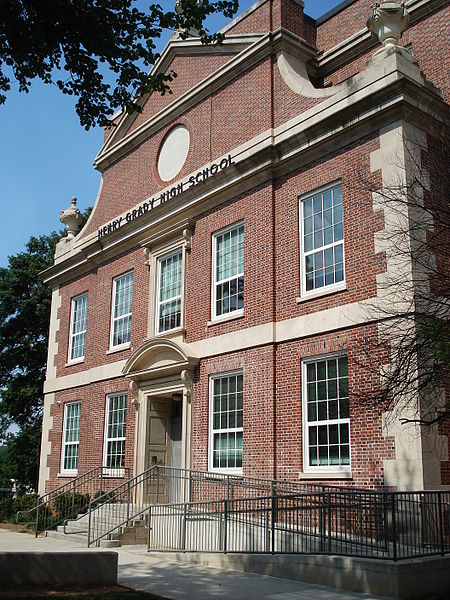Midtown Atlanta from the Northwest near the Cobb County/Fulton County border on the Chattahoochee River. Atlantic Station is visible to the left with the Atlantic skyscraper in the foreground.
Atlanta is the capital and most populous city in the US state of Georgia. According to the 2010 census, Atlanta's population is 420,003.[3] The Atlanta metropolitan area, with 5,268,860 people,is the third largest in the Southern United States and the ninth largest in the country. The Atlanta Combined Statistical Area, a larger trade area, has a population approaching six million and is the largest in the Southeast. Like many urban areas in the Sun Belt, the Atlanta region has seen increasing growth since the 1970s, and it added about 1.6 million residents between 2000 and 2010.
Piedmont Park
Atlanta is considered to be a top business city and is a primary transportation hub of the Southeastern United States—via highway, railroad, and air.[5][6] Metro Atlanta contains the world headquarters of corporations such as The Coca-Cola Company, The Home Depot, AT&T Mobility, UPS, Delta Air Lines, and Turner Broadcasting. Atlanta has the country's fourth-largest concentration of Fortune 500 companies, and more than 75 percent of Fortune 1000 companies have business operations in the metropolitan area, helping Atlanta realize a gross metropolitan product of US$270 billion, accounting for more than two-thirds of Georgia's economy. Hartsfield–Jackson Atlanta International Airport has been the world's busiest airport since 1998.
Atlanta is the county seat of Fulton County and the location of the seat of government of the state of Georgia. A small portion of the city of Atlanta corporate limits extends eastwards into DeKalb County. Residents of Atlanta and its surroundings are known as "Atlantans".
Climate
Atlanta has a humid subtropical climate, (Cfa) according to the Köppen classification, with hot, humid summers and mild winters that are occasionally cold by the standards of the southern United States. January averages 42.7 °F (5.9 °C), with temperatures in the suburbs slightly cooler. Warm, maritime air can bring springlike highs while strong Arctic air masses can push lows into the teens (−11 to −7 °C). High temperatures in July average 89 °F (31.7 °C) but occasionally exceed 100 °F (38 °C). Atlanta's high mean elevation distinguishes it from most other southern and eastern cities, and contributes to a more temperate climate than is found in areas farther south.
Typical of the southeastern U.S., Atlanta receives abundant rainfall, which is relatively evenly distributed throughout the year, though spring and early fall are markedly drier. Average annual rainfall is 50.2 inches (1,280 mm). Temperatures at or above 90 °F (32 °C) occur more than 40 days per year; overnight freezing can be expected over 45 days, but high temperatures that do not climb above the freezing mark are rare.[41] Snow is not seen every year and averages 2.5 inches (6.4 cm) annually. The heaviest single storm brought around 10 inches (25 cm) on January 23, 1940.[42] True blizzards are rare but possible; one hit in March 1993. Ice storms usually cause more trouble than does snowfall; the most severe such storm may have occurred on January 7, 1973.[43] In 2010, Atlanta had its first White Christmas since 1882.
Extremes range from −9 °F (−23 °C) in February 1899 to 105 °F (41 °C) in July 1980.[44] More recently, a low one degree away from the record, was observed on January 21, 1985.
Culture
Atlanta, while very much in the South, has a culture that is no longer strictly Southern. This is due to the fact that in addition to a large population of migrants from other parts of the U.S., nearly three-quarters of a million foreign-born people make Atlanta their home, accounting for 13 percent of the city's population and making Atlanta one of the most multi-cultural cities in the nation.[74] A random Atlantan is more likely to have been born in Bangalore, Seoul, or Indianapolis than in Atlanta. Thus, although traditional Southern culture is part of Atlanta's cultural fabric, it's mostly the backdrop to one of the nation's leading international cities. This unique cultural combination reveals itself at the High Museum of Art, the bohemian shops of Little Five Points, and the multi-cultural dining choices found along Buford Highway.
Entertainment and performing arts
The Fox TheatreThe classical music scene in the metropolitan Atlanta area includes the Atlanta Symphony Orchestra, Atlanta Opera, Atlanta Ballet, Gwinnett Ballet Theatre, Atlanta Baroque Orchestra, New Trinity Baroque, the Metropolitan Symphony Orchestra, Georgia Boy Choir and the Atlanta Boy Choir. Classical musicians have included renowned conductors Robert Shaw and the Atlanta Symphony's Robert Spano.
The Fox Theatre is an historic landmark and one of the highest grossing venues in the world. The city also has a large collection of highly successful music venues of various sizes that host top and emerging touring acts. Popular local venues include the Tabernacle, the Variety Playhouse, The Masquerade, The Star Community Bar and the EARL.
The city contains a flourishing theater community. Major Theater groups include the Tony Award-winning Alliance Theater (part of the Woodruff Arts Center), the internationally-known Center for Puppetry Arts, Theatrical Outfit, Seven Stages Theater, The Horizon Theater Company, improv group Dad's Garage, Actor's Express, and the Shakespeare Tavern.
Stormtroopers at Atlanta's St. Patrick's Day parade
Atlanta is also a major hub for the marching arts. The city is home of Spirit Drum and Bugle Corps, who competes in Drum Corps International, and both Alliance Drum and Bugle Corps and the CorpsVets Drum and Bugle Corps, both of which participate in the Drum Corps Associates circuit.
Atlanta is the home of recording studios/companies So So Def Recordings, Grand Hustle Records, BME Recordings, Block Entertainment, Konvict Muzik, and 1017 Brick Squad
Delta Air Lines headquarters
Transportation
Air
Hartsfield-Jackson Atlanta International Airport (IATA: ATL, ICAO: KATL), the world's busiest airport as measured by passenger traffic and by aircraft traffic,[165] provides air service between Atlanta and many national and international destinations. Delta Air Lines and AirTran Airways maintain their largest hubs at the airport.[166][167] Situated 10 miles (16 km) south of downtown, the airport covers most of the land inside a wedge formed by Interstate 75, Interstate 85, and Interstate 285. The MARTA rail system has a station in the airport terminal, and provides direct service to Downtown, Midtown, Buckhead, and Sandy Springs. The major general aviation airports near the city proper are DeKalb-Peachtree Airport (IATA: PDK, ICAO: KPDK) and Brown Field (IATA: FTY, ICAO: KFTY). See List of airports in the Atlanta area for a more complete listing.
Arts Center Transit Station
Public transportation
Notwithstanding heavy automotive usage, Atlanta's subway system, operated by Metropolitan Atlanta Rapid Transit Authority (MARTA), is the seventh busiest in the country.[173] Feeding into the rail system is MARTA's bus system. the 14th largest in the country. MARTA rail lines connect many key destinations in the area such as the airport, Downtown, Midtown, Buckhead, Perimeter mall, and Decatur. However key central destinations such as Emory University and Turner Field remain unserved.
There is no commuter rail in Metro Atlanta at this time, and MARTA rail lines only reach the innermost suburbs such as Sandy Springs, Brookhaven, College Park and Decatur – only Fulton and DeKalb Counties chose to join MARTA; Cobb, Gwinnett and other counties chose to stay out of MARTA. To provide a public transportation option for suburban and exurban commuters, the Georgia Regional Transportation Authority operates the Xpress bus service from Downtown and Midtown Atlanta to 12 counties.
You have read this articleThe United States
with the title Atlanta. You can bookmark this page URL http://oinsweden.blogspot.com/2014/08/atlanta.html. Thanks!
Write by:
AN - Saturday, August 2, 2014






















.jpg)

Comments "Atlanta"
Post a Comment